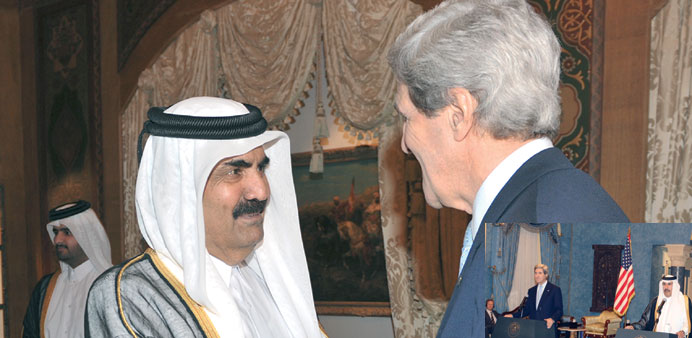|
|
Prime Minister and Foreign Minister HE Sheikh Hamad bin Jassim bin Jabor al-Thani has underlined that Qatar wants stability in the region but at the same time “we cannot accept the way the Syrian people have been slaughtered and their sanctities violated”.
Speaking at a joint press conference with visiting US Secretary of State John Kerry yesterday, the Premier said: “We want stable legal regimes to develop and promote their countries and their people and meet their needs, not regimes that work for destruction.”
The Premier welcomed Kerry’s visit to Qatar, saying that “this is not his first visit, but his first after assuming his new post as secretary of state, and we know him very well and we are aware of his ability to do the requirements of the job and that he would represent his country in the best way”.
He said: “We discussed a number of important issues including Syria, developments of the so-called ‘Arab Spring’, what is happening in the region and the peace process as well as the serious role to be played the US to revive it as a main sponsor.”
Answering a question about an understanding with the US on the Syrian crisis, especially on the issue of arming rebels, Sheikh Hamad bin Jassim said the US opposition to it might be softening.
“There is a change in the international position and the American position in this regard. They are talking about weapons,” he said.
“We (had) hoped that this (would have) happened some time ago, before, because this would have maybe lessened the death and destruction.”
He stressed that everyone now came to believe that Bashar al-Assad had chosen a method to end the crisis his own way, and this method could not receive the approval of the international community, especially after Assad’s forces had used Scud missiles to kill innocent people and to demolish cities, a reminder of the World War II scenes.
He noted that the recent Geneva declaration by the “Friends of Syria” had called for the transfer of power to a transitional government with full authorities. Explanation of the declaration has differed. However, he said the transition period should be limited in order to avoid procrastination by the Syrian regime which had already turned down many Arab initiatives.
Answering a question on fears that weapons supplied to the opposition in the Arab Spring countries would fall into the hands of extremists, he said the same was said when Qatar supported Libyan rebels in the early days of the revolt against Muammar Gaddafi, noting that the West heeded talk about terrorism and some parties were exploiting the issue. “Only people have the right to choose their leaders,” he stressed.
The longer the Syrian crisis persisted the more extremist groups were attracted, he said , explaining: “We want moderate parties to win”. He said the danger lay in the actions of the regimes that killed civilians. “Bashar al-Assad now is the terrorist because it was he who started by killing his own people.”
The Prime Minister pressed Kerry and President Barack Obama to try to revive Israeli-Palestinian peace talks, which collapsed in 2010.
“We talked about the peace process, which is at a standstill now or maybe even dead for all intents and purposes,” he said. “We hope that there will be some real movement by the main sponsor, and that is the US of America.”
Sheikh Hamad bin Jassim said he had felt optimistic about the peace process when Obama came into office in 2009 but suggested those hopes had waned.
“Now the peace process is just a process, it is not a solution, or a final solution, for this crisis,” he said.
“We hope this dossier will be a priority now for the US administration and your Excellency will take personal (interest) in this.”
Kerry said that Washington was increasingly confident that weapons being sent to the Syrian opposition by other countries were going to moderate forces.
Kerry said that he had held talks with nations in the region to discuss the kinds of arms being sent to the different Syrian opposition forces.
“We did discuss the question of the ability to try to guarantee that it’s going to the right people and to the moderate Syrian opposition coalition and I think it’s really in the last months that has developed as a capacity that we have greater confidence in.”
Some 70,000 people have been killed in Syria and nearly a million have fled the country in a two-year uprising, the UN says.
The conflict began two years ago as peaceful protests that turned violent when President Assad tried to crush the revolt.
Kerry said the US could take other actions if Assad did not choose to give way peacefully, a possibility that seems remote after two years of fierce fighting.
In Rome on Thursday, Kerry announced that the US would shift policy to provide medical supplies and food directly to opposition fighters, an option it had previously rejected.

